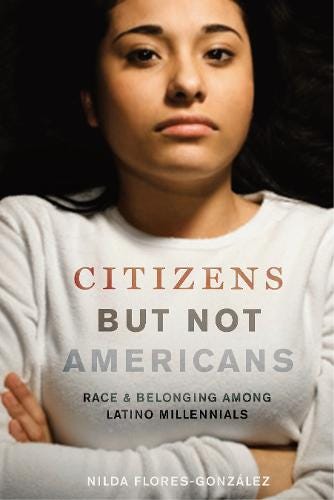Generation divides are very American and white
Why we should be more careful with its broad use
If you were 18 during the 2008 crash and just beginning your adult life, you were affected differently than your parents and older generations, who had a more solid foundation to stand on.
Generations are based on this principle. That each generation will pass through so-called formative experiences at a young age that will shape them differently from other generations. Those born within a certain period will have distinctive attitudes because they lived through the same world events.
Shouldn't we expect formative experiences to depend on place and context, just as we would expect them to affect different generations differently based on their age differences?
We may live on the same planet that undergoes the same world events, but we are not affected similarly by each and every one of them. Generational divides, as we understand them, presuppose that we are, in general, immersed in the same society and that we relish and suffer from the same societal changes.
But a crucial historical fact in one country may not affect the same age groups in another in the same way. Factors such as race, class, and nationality will impact our worldviews much more than generations, making it impossible to group everyone into a single giant bucket.
For instance, 9/11 had a huge effect on millennials living in the US and is usually deemed one of those formative events for this generation. But people living in the Middle East were affected by it in a completely different way; people in European countries who later joined the Iraq and Afghanistan invasions were impacted in another way, while in Brazil it meant something else. For 11-year-old me, it was a scary moment, but basically, nothing much changed except that airports got extremely annoying.
Even inside the US, I'm sure Christian and Muslim millennials were affected very differently by this specific event.
In fact, generational labels are so contentious that over 150 social scientists wrote a letter to the Pew Data Center asking them to retire their use. They defend the fact that generations have been declared and named ad hoc without empirical or theoretical justification, so they shouldn't be so broadly accepted and used.
Take Millennials, for instance
Howe and Strauss coined the name Millennial in their 1991 book Generations: The History of America's Future, 1584 to 2069. As they later wrote in another book, Millennials Rising, millennials are characterized by seven "core traits": sheltered, confident, team-oriented, conventional, pressured, and achievers. These traits were based on anecdotes, statistics, pop-culture references, and a survey of approximately 600 high school seniors from Fairfax County, Virginia, which had a median household income about twice as high as the US average. According to the book, millennials are "rule followers who are engaged, optimistic, and downright nice". As baby boomers and parents of millennials, it's easy to assume that Howe and Strauss would think of their children as special.
Much less charitable with millennials, Gen-Xer psychologist Jean Twenge described millennials as we would be known more prominently: narcissistic and self-absorbed, in her 2006 book Generation Me: Why Today's Young Americans Are More Confident, Assertive, Entitled, and More Miserable Than Ever Before.
So are we engaged, team-oriented, charitable, or extremely narcissistic? Since there are over 2 billion millennials in the world, I would say we are all of that and more.
Although Jean Twenge aimed for higher scientific accuracy and did broader research, both descriptions lack solid studies to back up everything said in their books.
Mostly, it was a label given to white, affluent teenagers growing up in US suburbia who faced anxiety when applying to elite colleges. They multitasked effortlessly with their helicopter parents hovering over them. It didn't apply to minorities, the poor, those without parental support, those living in big cities, teenagers who never won a spelling bee, or most people outside of the United States.
When I listen to millennials talking about their generation's pain points on YouTube or elsewhere, I find many shared experiences between me, my friends here in Europe, and them over in the US. But sometimes I wonder if the fact that I am white and middle-class, even if I never lived in the US, is not what makes me relate more to my generational peers, and not just being from the same generation.
For instance, one shared experience, usually touted as the most influential for millennials, was growing up with the internet. As we grew, so did the internet itself. That may be the experience for me, who started accessing the internet in 1998–1999 and has had a computer at home since 1994. But that was not the case for the large majority of Brazilians born at the same time as me. In fact, although internet access has become ubiquitous nowadays because of mobile phones, only 55.6% of homes in Brazil had an internet connection as late as 2019. Worldwide, 35% of the world's population still lacks internet access, even on mobile phones.
Commonly deemed formative experiences for millennials are actually far more exclusive to a very small range of the global millennial population than we give them credit for.
In the end, those experiences and attitudes are not fully relatable to most. However, we unquestionably take belonging to the same generation for granted and accept it as a fact. And we inadvertently mold our ways and attitudes accordingly without wanting to do so.
Some differences between what we understand are very millennial issues and the rest of the world
College debts
Well, this one is the easiest to address. Many millennials in the US are drowning in debt, largely because of university costs. That's not the case almost anywhere else in the world.
The most prestigious and competitive universities in Brazil are free, as in zero dollars. I have never had any debt in my life and would probably be sleepless if I did. I don't even want to have a mortgage because of my fear of indebtedness.
Here in Europe (not the UK), university costs are also pretty manageable for middle-class parents to pay. It's usually between 500 and 3,000 euros per year, if not completely free as in Austria.
College debt is not even so ubiquitous among millennials in the US, since only around 20% of people attend college and are in debt because of it.
Low house ownership
It's pretty grim everywhere when it comes to the housing market. That's not exclusive to the US, where it's only exacerbated. A lot of it is caused by older, rich people (in the US, huge companies) who buy out as many houses as possible to turn them into rentals or Airbnbs. Since Europe is extremely touristy, this greed has also raised housing prices, making it unaffordable for many millennials and Gen Z to buy houses here.
Still, more and more cities are creating rules to stop Airbnb and house ownership in Belgium is 72.5%, meaning 72.5% of the population owns their own house, compared to 65% in the US. But I guess the most telling statistic is that the median price of a house in the US is $416,100, while in Belgium it is almost half: $237,023.
The 2008 crash
It seems almost impossible to believe, but the 2008 crash affected countries very differently. For instance, it almost didn't affect Brazil or China, which at that point experienced a growing economy. What we did have in Brazil were political and economic crises between 2015 and 2018, which impacted me at a totally different moment in my life than they would have in 2008.
On the other hand, European countries suffered immensely from the crash, especially southern countries such as Italy, Spain, Greece, and Portugal. My partner is Spanish, and having been through that period at a young age has made him far more worried about money than I am, which is more in line with the experiences of people in the US. Even if he was born on the border between Gen Z and millennials.
Now, there are global trends that have been ubiquitous and affected everyone quite similarly
(Or at least through my white, well-off lenses.)
Overwork and increased competition (or its sense)
Because our parents are Baby Boomers, the largest generation, we also have a large cohort: 2.43 billion millennials worldwide. That makes our lives far more competitive from a young age. When combined with our parents having fewer children and more time and resources for us, it created a generation of exemplary employers.
From a young age, I had many after-class activities: swimming, ballet, art, tennis, English, music… I was always busy with productive activities. I had an insane amount of homework, and I have never studied as much as I did in high school. In my last year of school, I had full-time classes two days a week and three exams every Friday afternoon. It was insane. That was the price paid to enter that coveted, free university.
I had to study and do far more specializations and learn more languages and skills than my parents ever had, just to try to have the same kind of life they have.
Precarious work in the gig economy
The rise of the gig economy through apps such as Uber, Lyft, and Fiverr, and even the rise of the ‘influencer market’, has taken away workers’ rights and made everyone's work far more precarious.
Of course, it is far more problematic in the US and in countries without safety nets and almost no workers’ rights. But still, we are seeing a big rise in self-employed workers everywhere, which moves the needle in the wrong direction for everyone. Less paid vacation, less compensation, no health insurance, no transport fees, no food allowances, etc.
Social media and its positive and negative developments
Social media has reached all corners of the world, to the point where in many countries (including Brazil), a lot of the population thinks Facebook, with its roughly 3 billion users, is the internet. Social media is largely responsible for the increase in fake news, conspiracy theories, polarization, the rise of the far-right, and even genocides everywhere. So, those who don't even have direct access to social media have suffered from its consequences for politics and many facets of our lives. It certainly affects millennials everywhere.
How generations came to be
When we look at how generations were created, it's easy to see why our current understanding is skewed toward the United States. The generations were, after all, named by US citizens, taking US history into account.
Our current view of generations comes largely from Strauss and Howe's 1991 book Generations: The History of America's Future, 1584–2069, which discusses the United States' history as a series of generational biographies dating back to 1584. Each generational persona unleashes its own era (called a turning) lasting around 20–25 years in which a shift in social, political, and economic climate mood exists. They are part of a larger cyclical "saeculum", (century in Latin).
Academic response to the theory has been mixed, with some applauding Strauss and Howe for their "bold and imaginative thesis", while others criticize the theory as being overly deterministic and unsupported by rigorous evidence. Academic criticism focuses on the lack of rigorous empirical evidence for their claims. Additionally, the authors argue that generational groups are more powerful than other social groups, such as economic class, race, sex, religion, and political parties, which of course is controversial.
Even with the backslash, Generation X, Y, Z, and other generational labels coined in the book were firmly embedded in popular culture.
But it wasn't until business books started analyzing generations in terms of purchasing preferences, technology use, media consumption, and work demands that generations took off and became increasingly influential. The generational divide seemed perfect for marketing as a way to categorize customers into "buying personas."
"Buying personas" are simplified caricatures of consumers. In the same way, generations were understood as a fairly homogeneous group of people who shared commonalities based on their formative experiences and differed from other generational groups in meaningful ways. That led to reduced caricatures, such as Baby Boomers as self-centered workaholics; Generation Xers being labeled as “slackers”; millennials being materialistic and narcissistic; and Generation Z being viewed as fragile and hyper-sensitive.
These narratives are compelling in their simplicity. They reduce social change complexity into an easy-to-apply typology. A person's birth year seems to give you all you need to know to judge a person’s character, life goals, values, and purchasing intentions. It almost feels like a simplified horoscope.
It gets even more complicated as one applies these oversimplified caricatures to the whole globe. Even if those talking about their own experiences in their generations are not explicitly doing so, since we don't have references for how the generational experience of each different country is across race and social class, what we are left with to understand what generations are, are the broad perceptions of the generations in the US. How they interact, how they see and experience the world, and how they are affected by specific formative events in their country.
The United States is still the most powerful country in the world. The election of a president there still affects people everywhere, but not in the same way. Often, a local event such as a president's impeachment, the enactment of a law, or even an environmental disaster in your own country will be far more influential on your personality and how you understand the world.
There are indeed global similarities, and generation labels can be useful in some contexts. However, especially for us outside of this small sample of people, we should be aware not to overidentify with experiences that are not ours. And for those who think their experiences are global, please be careful not to oversimplify your experiences as everyone else's.
Citizens but Not Americans: Race and Belonging among Latino Millennials by Nilda Flores-González.
I haven't read this book, but it fits the topic perfectly. By examining Latino millennials’ self-understandings of race and belonging, Flores-González contributes to ongoing debates concerning conceptual distinctions between race and ethnicity, the transformation of the US color line, and the ethno-racial dimensions of citizenship.
Neighbors (2014)
New parents Mac (Seth Rogen) and Kelly (Rose Byrne) move to the suburbs when they welcome an infant daughter into their lives. Teddy (Zac Effron) leads a fraternity in the house next door, changing the lives of everyone in a generational crash. Mac and Kelly want to feel younger while engaging in the fraternity world, but of course, they soon discover time has moved on. Watch it on Saturday afternoons to waste some time and have some fun, even if it isn't the funniest (or cleverest) movie in the world.
Upright (Fox)
The fucked-up middle-aged man who has his life changed by a young teenager is a well-known trope. Still, I truly enjoyed watching Upright. It mixes this trope with the fun and absurdity of road trip movies while not shunning larger issues such as family struggles and dealing with death. Set in Australia, this series has eight thirty-minute episodes and is as binge-able as possible. Also, if you are a fan of House of the Dragon as I am, it is a delight to watch our young Queen Rhaenhyra (Milly Alcock).









Good post. It’s refreshing to see someone push back on the whole idea of generations, which does seem like a lazy way of grouping people that starts to fall apart as soon as you dig into it (like astrological signs).
The 20% figure for U.S. college enrollment is not clear. Not sure if you’re referring to the current college-age population or the larger adult population, and then only those with college debt? The overall percentage is quite a bit higher for both:
https://nces.ed.gov/programs/coe/indicator/cpb
https://www.census.gov/newsroom/press-releases/2022/educational-attainment.html
U.S. college cost might be a bit overstated and appears to be actually getting cheaper:
https://www.economist.com/united-states/2023/07/23/american-universities-have-an-incentive-to-seem-extortionate
Nicely said, Luiza. As someone who writes quite a bit about generational conflict, I think you make some good points here!
I'm currently reading "The Nineties" by Chuck Klosterman, which so far has some interesting things to say about Generation X and their place in all this between Boomers and Millenials.